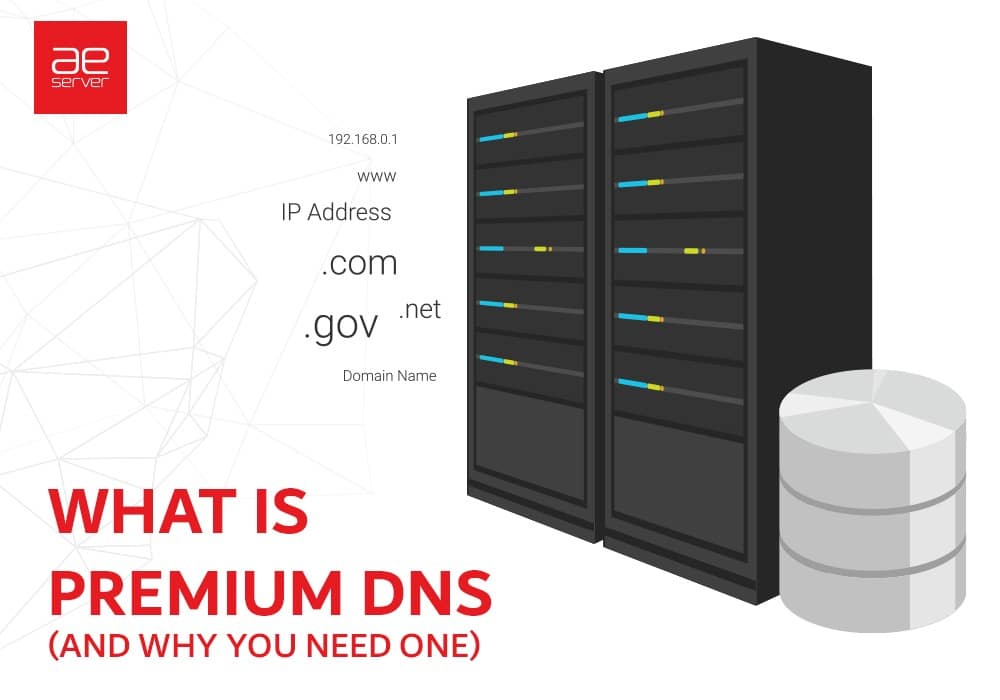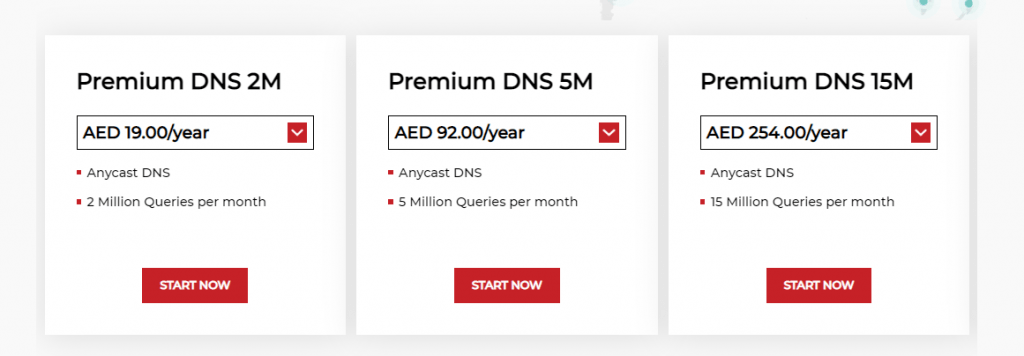
What Is Premium DNS (and Why You Need One)
Cyber attacks are now a serious risk for organizations in all fields. Protecting your business from hacking attempts is essential, and it is also important to make certain that your website stays online in the event of a cyber attack while maintaining fast load times and guaranteed uptime. Taking that into account, many organizations are looking for premium DNS. But before you look into DNS options, let’s dive into the risks you can face and how a premium DNS prevents your website from online threats.
What is DNS?
Domain Name System (DNS) controls how your visitors find your website and how you receive emails. Its purpose is to match domain names to the IP address. You can think of it like a phonebook, where IP addresses are the phone numbers and domain names are people’s names.
When a user searches for a domain name in their browser, the DNS pulls up the IP address of that particular domain and delivers it to the user. That is how your visitors can access your website. Browsers automatically bring users to your site they are trying to reach if your DNS hosting is working smoothly.
Identifying DNS Threats
As hackers are working on creating new mechanisms to compromise systems, the rate of DNS attacks is increasing and becoming more difficult to prevent.
Following are the common DNS based attacks:
DDoS Attack:
Distributed denial of service (DDoS) is the attack where a hacker targets network traffic to block web servers and bring them down. It includes subdomain attacks, DNS flood and traffic amplification to fill your servers with junk traffic and bind their processing to prevent legitimate users from visiting your website.
Domain Hijacking:
When a hacker re-routes queries from your server to destinations they control, usually to insert malware into your endpoints.
DNS Spoofing:
when a hacker injects malware into your DNS system so that they can redirect your DNS query traffic.
DNS recursion: when a hacker floods your DNS infrastructure, that can cause downtime.
Ways to Secure DNS
Given the number of DNS attacks, there have been a variety of methods you can implement to secure this protocol. However, these technologies are not much of an advantage, but it’s still better to implement than nothing.
DNSSEC:
DNS security extension was first proposed in 2010. It works on cryptographic signatures to verify DNS responses are coming from the intended server. While the authentication is useful, it does not protect the privacy of DNS conversations.
How Does SSH Work: Everything You Need to Know
DoH:
DNS over HTTPS or TLS sends requests over the transport layer using encryption. This prevents a man in the middle attack that could be done with unprotected conversations. The TLS version hides the traffic even further and also offers a slight performance boost.
DNSCrypt:
it is used to prevent DNS spoofing attacks and has various open-source implementations.
AEserver’s Premium Global DNS
As these DNS compromises are becoming an issue, there are a number of free and premium DNS providers available to offer protection against these threats. Let’s see what you will get in AEserver’s premium DNS
- Unmatched Availability and Security
- Turbo Response Time
- Over 30 global locations included in every plan
- DNSSEC Supported
Leveraging Anycast technology and built for superior resiliency, AEserver’s Premium DNS comes with a 100% SLA for DNS resolution. It can be used with any domain name (.ae, .com, .net, .xyz, etc.) registered with any registrar globally.
Following are the DNS plans AEserver provided:
In addition, when you buy AEserver’s hosting plan, i.e. windows hosting, Linux hosting or managed wordpress hosting, you will get this premium DNS free in any business plan.

Free DNS Vs Premium DNS
There are many free DNS providers available. They usually provide DNS hosting along with domain registration. Meanwhile, a premium DNS service includes more benefits such as better security, more website speed and apps integration.
Free DNS features
First, take a look at some features included in a free and premium DNS.
Firewall Policy: To determine the type of website traffic and block unwanted traffic in the process.
Limiting and Blocking: limits the number of requests to control the negative impact a system might suffer, such as from malicious bot activity.
Secondary DNS: Contains copies of the original site files. It ensures a site will be accessible even if the primary DNS is hacked or suffers from other types of failure.
Multiple DNS Record Support: every domain must have a few DNS records, such as A, MX, SOA, CNAME, MX and NS records. DNS records provide numerous domain information, such as its IP address.
SSL Certificate: It helps to secure data transfers and encrypt sensitive user data, such as customers’ addresses and credit card information.
Does My Website Need SSL? Know Why It Really Matters!
Email Forwarding: It is mostly useful for business websites. When a user sends an email to your business email, the email will automatically forward to your personal email to let you check all the emails in one place.
Web Redirection: It helps in making a website accessible from more than one URL. In case you changed your URL and the user type in the old URL, he can still access the site.
Dynamic DNS (DDNS): Whenever an IP address is changed, DDNS automatically update the record by making it possible for the users to access the site even if the IP address is constantly changed.
Premium DNS Features
In addition to the features of free DNS, a premium DNS includes the following features:
Advanced reporting: A detailed reporting system with analytics that includes information such as record types and source countries of the requested hostnames.
DNS Templates: Includes pre-defined DNS formats for domain names and makes easy DNS updates from the dashboard. This feature is especially useful for managing multiple sites.
Two-factor Authentication: Includes a 2FA to provide an extra layer of security.
DNSSEC Support: It provides an extra layer of security against cyber threats. It uses public-key cryptography to provide digital signatures on authoritative zone data, which is validated at its destination.
Professional Support Team: You can get more support with a paid DNS service compared to the regular support system.
Anycast Global Network: A network that duplicates information across multiple DNS servers globally. The device accessing the website will reach the server located nearest to the user for a faster response.
Benefits of Premium DNS You Shouldn’t Miss
There are loads of free DNS providers available out there, but premium DNS providers offer much more advantages than the free ones to ensure the highest availability, better security and boost the speed of your website.
Better Security
A premium DNS is equipped to better protect your website from large-scale DNS threats, especially DDoS attacks. It ensures the integrity and authenticity of your data in the event of DDoS attacks.
Premium DNS has advanced security settings to safeguard your website and ensure your domain, email, and web forwarding records remain up.
Boost Website Speed
Another advantage of premium DNS is that it boosts your website speed. On average, a visitor only waits for three to four seconds on a website to load; otherwise, they leave your site and choose your competitors.
As premium DNS runs on a global cloud network, it speeds through servers across the globe to ensure the highest availability, low latency delivery time and give your visitors the fastest web experience.
Business Apps Integration
A premium DNS offers you an advantage to integrate your social apps or business into your website. You can post content on all your software in just one click.
Do You Really Need a Premium DNS Service?
Expert services claim that having a paid DNS is now necessary to run a website. However, it is not always true.
You can try free DNS hosting first to see if it works for your website and then decide whether you need a premium DNS. If you decide that premium DNS is the best option for your domain, it will only take a few simple steps to switch your service from the free version to the premium version. Once you have decided that your domain requires a premium DNS, think about your future requirements to evaluate which plans match up with your requirements.
Conclusion
A standard DNS can pretty much do the job, but premium DNS is ideal, especially if you have a large website with high traffic.
For better security and improved site traffic, Premium DNS is an excellent choice. By turning to AEserver UAE-Based Hosting for your Premium DNS needs, you’ll stay safe from DNS threats. With global servers, you will get 100% uptime and advanced protection to protect your connections. Our Premium DNS option is a great option for any business. It’s just one more way we help keep your business safe and running smoothly online.
So what are you waiting for? Secure your website with premium DNS today so you can perform better, sell faster and earn more.



